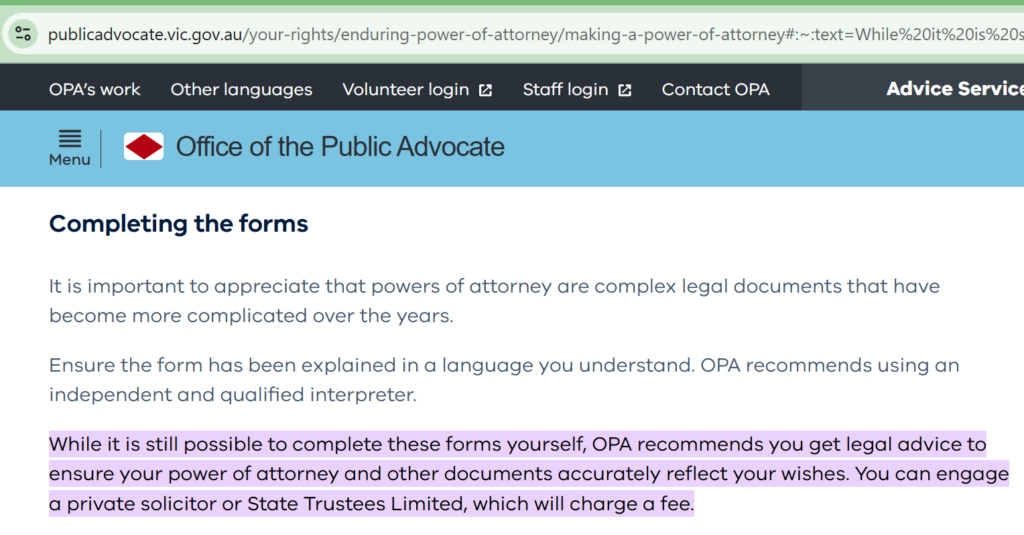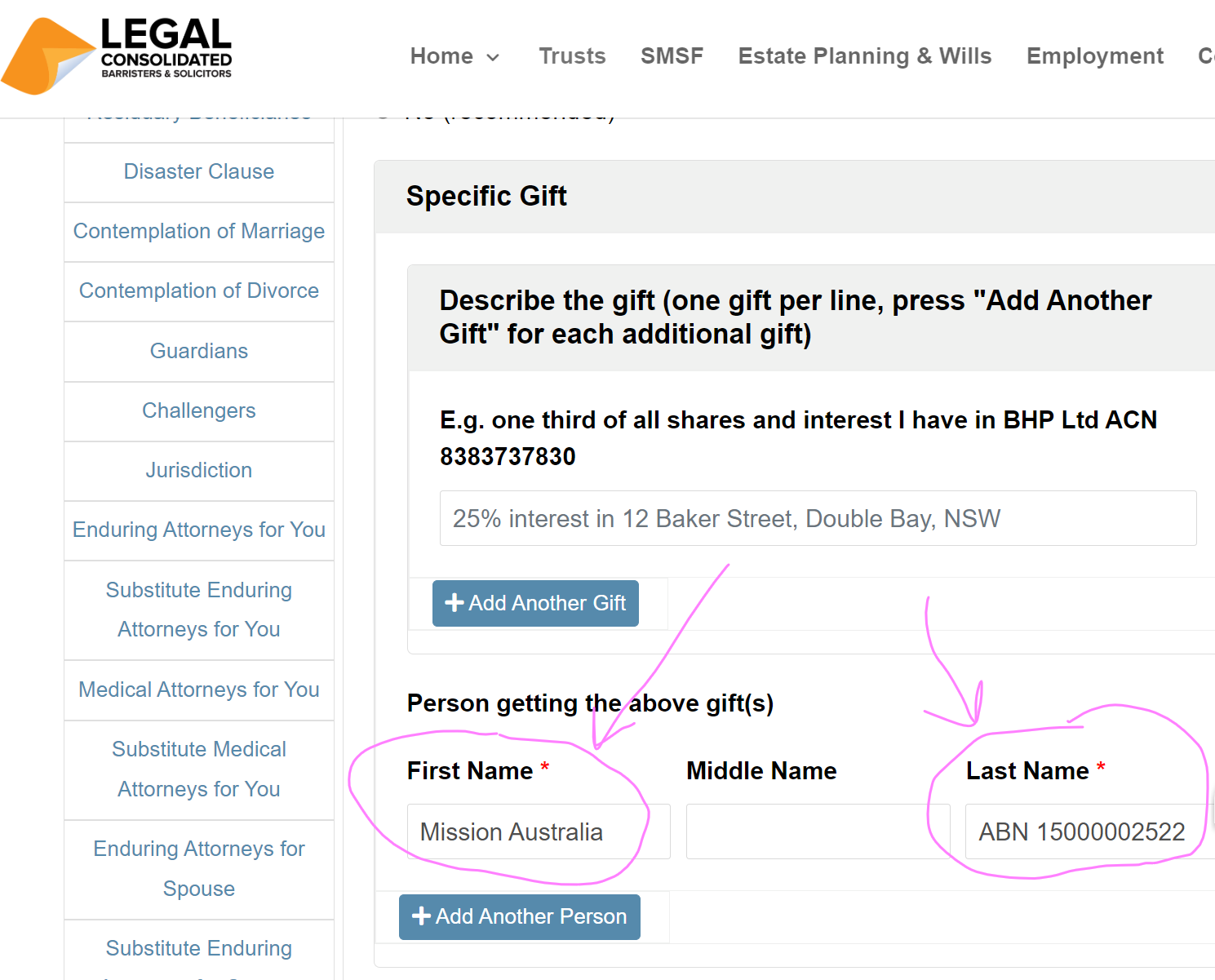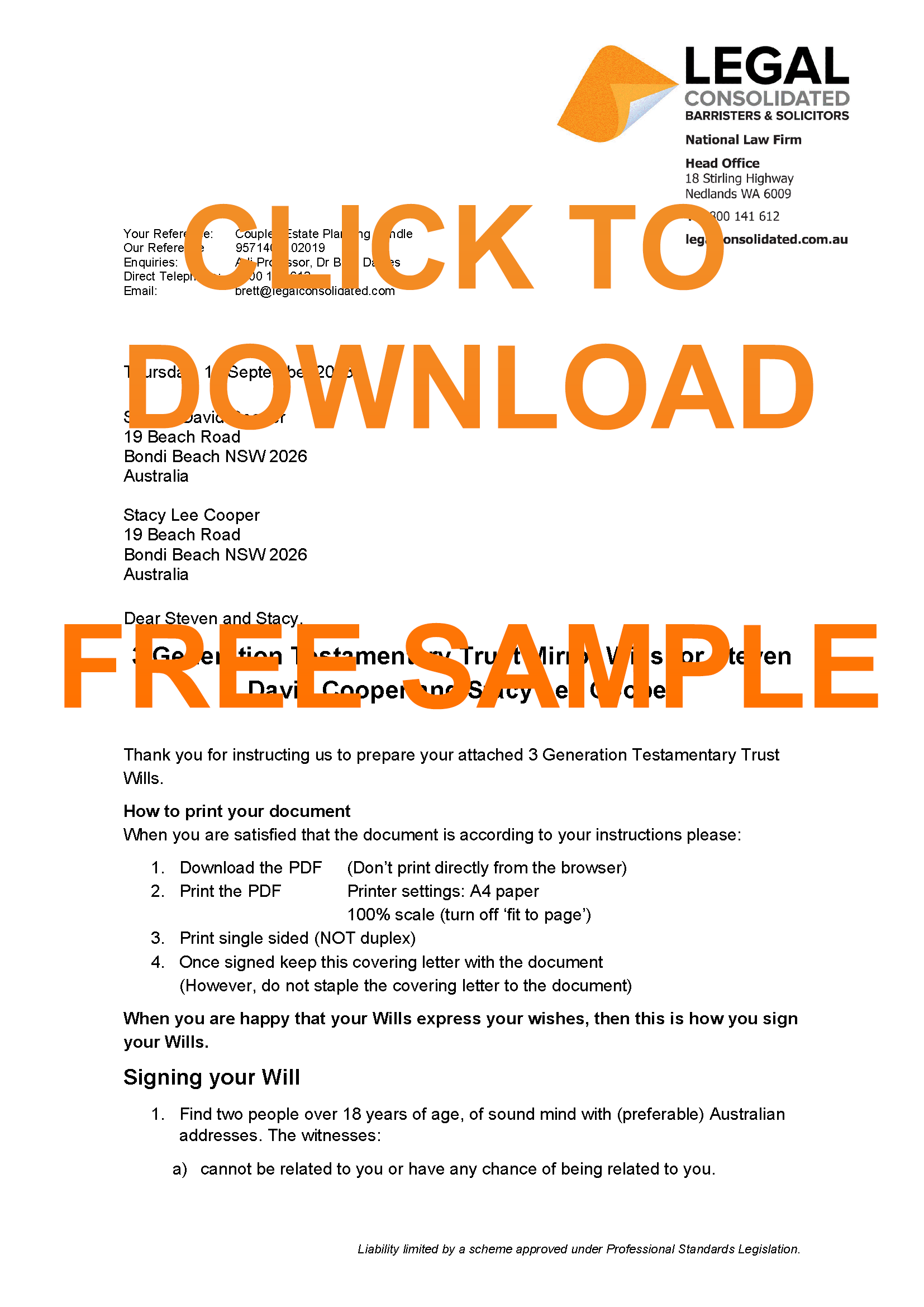
Enduring Power of Attorney
$128 includes GST
-
For every state • NSW • VIC • QLD • WA • SA • TAS • NT • ACT
Build Your SA Enduring POA with Lifetime Peace of Mind
Build your legally compliant Enduring Power of Attorney online in just 14 minutes. Our unique law firm service includes:
-
Free POA Updates for Life: Amend your POA anytime, completely free of charge.
-
Free Legal Advice for You: As a client, you receive ongoing legal support from our firm for the rest of your life.
-
Free Guidance for Your Attorneys: We support the people you appoint, helping them understand their duties at no cost when the time comes.
What is an SA Enduring POA?
A South Australian Enduring Power of Attorney is a legal document. The SA Enduring POA allows you to appoint a person to make decisions about your assets in SA and bank accounts.
What can’t a South Australian POA do?
The SA POA is an “economic” document. Your SA Enduring POA does not deal with your health treatment or lifestyle. To do this, instead, build a South Australia Medical POA on our website. Also, the person receiving your SA EPA cannot:
* vote in any elections
* make a Will
* sign another POA
* act as a Trustee
* control your body (you need to build a POA for lifestyle on our website for that)
However, the person getting your SA EPA, can open and close bank accounts, pay debts, and buy and sell land. This is provided it is in your ‘best interests’ to do so.
How does the person receiving my SA POA actually use the SA POA?
Here are some examples:
Example 1 – Using your SA bank account
The persons you appoint walk into the bank and presents to the bank clerk your Savings Account book and your South Australian POA. Your clerk stares blankly at them. He sees his bank manager. The manager explains to the clerk that those persons “now stand in your shoes”. They can do whatever you can do with the bank account. The bank manager requests a copy of the SA POA for future reference. The manager tries to keep the original SA POA, but the persons you nominate decline and get back the SA POA. The transaction has been processed on the account.
Example 2 – Signing your legal documents
You tell the persons that you nominated to sign a lease agreement. You are on holiday overseas and email is unavailable. Your attorney contacts the landlord. They:
1. Tell the landlord that there is an SA Enduring POA.
2. Tell the landlord that they are signing the lease on your behalf.
3. They sign in their usual signature area and write under the signatures “signed as attorney for *your name* under an SA Power of Attorney dated ## Month, year”.
You are now bound to the lease. The landlord may photocopy the SA POA to attach to the lease.
Why pay to have a specialist tax law firm prepare my SA POA?
Apart from free updates and advice for the rest of your life, 32% of POAs prepared on the ‘free’ government website do not work. For that matter, approximately 12% of lawyer-prepared POAs are ineffective.

Can I appoint multiple attorneys who must agree on decisions?
This is a common question for SA POAS. Many South Australians want the flexibility of allowing their attorneys to act alone, but also want the security of requiring them to agree on major decisions.
However, in South Australia, the law requires a clear choice. You cannot legally have both. Attempting to create a custom “hybrid” clause results in the Power of Attorney being rejected by banks, the Titles Office, and aged care facilities due to unclear instructions.
You have two legally valid options:
1. Appoint Attorneys “Jointly and Severally” (They can act alone OR together)
This is the most flexible and standard option. Any single attorney can make decisions and sign documents on their own.
-
-
Benefit: It is highly practical. If one attorney is overseas, unwell, or unavailable, your affairs can still be managed without delay.
-
Drawback: This requires absolute trust that each attorney will act responsibly, as one could theoretically make a decision without consulting the others.
-
2. Appoint Attorneys “Jointly” (They MUST act together)
This option offers the most oversight but is often the least practical. All attorneys must agree on every single decision, and all must sign every document.
-
-
Benefit: It guarantees that no decision is made without unanimous agreement.
-
Drawback: It can cause a complete standstill. If one attorney disagrees or is simply unavailable, your financial affairs can be frozen, which could be disastrous in an emergency.
-
Our South Australian Built-in Safeguard: An Attorney’s Fiduciary Duty
While you must choose one of the options above, remember that every attorney appointed under a South Australian Enduring Power of Attorney has a strict fiduciary duty. This is a powerful legal obligation to always act in your best interests, to keep your finances separate from theirs, and to keep accurate records.
An attorney who breaches this duty can face severe legal and criminal sanctions. This powerful obligation provides a strong deterrent against an attorney acting irresponsibly or against your wishes. At Legal Consolidated, our cover letter accompanying the final documents reinforces these serious responsibilities.
An attorney would be foolish and at risk of both civil and criminal ramifications if they acted without consulting with the other attorneys and loved ones. For that matter, on the bigger issues, they would want a sign-off from an accountant and a financial planner. Even as an only child, the attorney needs to go out of their way to protect themselves.
What does “act in your best interests” mean in South Australia?
When you appoint someone as your attorney under a South Australian Enduring Power of Attorney, they are not just given power—they are given a profound legal responsibility known as a fiduciary duty. The core of this duty is the absolute obligation to act in your best interests.
This is not just a moral guideline; it is a strict legal command backed by both legislation and decades of court decisions. But what does it actually require in practice?
The principle requires your attorney to put your welfare, financial security, and personal wishes above all else, including their own interests. They must act as if making the decision on your behalf and make the decision they genuinely believe you would have made for yourself if you had the capacity to do so. This duty is designed to protect you when you are at your most vulnerable.
The Law: Powers of Attorney and Agency Act 1984 (South Australia)
The primary legislation governing these duties in South Australia is the Powers of Attorney and Agency Act 1984 (SA). While the Act does not provide a single definition of “best interests,” it outlines specific duties and limitations that give the concept its legal force.
Powers of Attorney and Agency Act’s key sections include:
- Section 7: Duty to Exercise Powers Honestly and with Reasonable Diligence
This section establishes the foundation of the attorney’s role. It requires them to “exercise the power honestly and with reasonable diligence to protect the interests of the donor of the power.” This means they cannot be lazy or negligent; they must actively manage your finances, pay your bills on time, and protect your assets from neglect or devaluation. - Section 11: Attorney may not benefit from the position
This is a critical rule against self-dealing and conflicts of interest. An attorney must not enter into a transaction in which they have a conflict of interest unless expressly authorised by the Enduring Power of Attorney or by a court. For example, they cannot:-
Transfer your property to themselves, their spouse, or their child for less than market value.
-
“Lend” themselves your money from your bank account.
-
Use your funds to buy an asset for themselves.
-
- A transaction that benefits the attorney is presumed to be an abuse of their power unless they can prove otherwise in a court or tribunal.
Duty to Keep Accurate Records
- An attorney must keep their own money and property completely separate from yours. This is a fundamental rule. They must also maintain detailed and accurate records of all transactions and decisions made on your behalf. These records must be available for inspection by you (the principal), a court, or another authorised body like the Public Trustee. This ensures transparency and holds the attorney accountable for every action they take.
Attorney’s Duties in South Australia
To “act in your best interests,” an attorney appointed under an Enduring Power of Attorney must adhere to the following principles:
- ✅ Act Honestly and Diligently: Manage your affairs with the care and prudence that a reasonable person would exercise in managing their own affairs.
- ✅ Prioritise Your Welfare: Your needs for housing, medical care, and financial security must always come first.
- ❌ Avoid Conflicts of Interest: Never mix their personal or business finances with yours. They must never use their position for personal gain.
- ✅ Keep Meticulous Records: Document every transaction and decision made on your behalf and keep all finances entirely separate.
- ✅ Respect Your Wishes and Values: Where your wishes are known, they should make decisions that align with your past values and preferences.
- ❌ Not Make Unauthorised Gifts: They cannot use your money to make gifts unless expressly authorised in the Enduring Power of Attorney or permitted by a court.
Protects from death duties, divorcing and bankrupt children and a 32% tax on super. Build online with free lifetime updates:
Couples Bundle
includes 3-Generation Testamentary Trust Wills and 4 POAs
Singles Bundle
includes 3-Generation Testamentary Trust Will and 2 POAs
Death Taxes
- Australia’s four death duties
- 32% tax on superannuation to children
- Selling a dead person’s home tax-free
- HECs debt at death
- CGT on dead wife’s wedding ring
- Extra tax on Charities
Vulnerable children and spend-thrifts
- Your Will includes:
- Divorce Protection Trust if children divorce
- Bankruptcy Trusts
- Special Disability Trust (free vulnerable children in Wills Training Video)

- Guardians for under 18-year-old children
- Considered person clause to stop Will challenges
Second Marriages & Challenging Will
- Contractual Will Agreement for second marriages
- Wills for blended families
- Do Marriages and Divorce revoke my Will?
- Can my lover challenge my Will?
- Make my Will fair: hotchpot clauses v Equalisation?
What if I:
- have assets or beneficiaries overseas?

- lack mental capacity to sign my Will?
- sign my Will in hospital or isolating?
- lose my Will or my home burns down?
- have addresses changed in my Will?
- have nicknames and alias names?
- want free storage of my Wills and POAs?
- put Specific Gifts in Wills
- build my parent’s Wills?
- leave money to my pets?
- want my adviser or accountant to build the Will for me?
Assets not in your Will
- Joint tenancy assets and the family home
- Loans to children, parents or company
- Gifts and forgiving a debt before you die
- Who controls my Company at death?
- Family Trusts:
- Changing control with Backup Appointors
- losing Centrelink and winding up Family Trust
- Does my Family Trust go in my Will?
Power of Attorney
 Money POAs: NSW, VIC, QLD, WA, SA, TAS, ACT & NT
Money POAs: NSW, VIC, QLD, WA, SA, TAS, ACT & NT
- be used to steal my money?
- act as trustee of my trust?
- change my Superannuation binding nomination?
- be witnessed by my financial planner witness?
- be signed if I lack mental capacity?
- Medical, Lifestyle, Guardianships, and Care Directives:
- Company POA when directors go missing, insane or die
After death
- Free Wish List to be kept with your Will
- Burial arrangements
- How to amend a Testamentary Trust after you die
- What happens to mortgages when I die?
- Family Court looks at dead Dad’s Will


